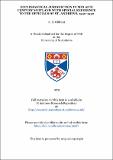Files in this item
Ecclesiastical jurisdiction in mid 16th century Scotland with special reference to the officials of St. Andrews, 1540-1550
Item metadata
| dc.contributor.author | Ollivant, S. D. | |
| dc.coverage.spatial | vii, 381 p. | en_US |
| dc.date.accessioned | 2018-05-29T11:56:47Z | |
| dc.date.available | 2018-05-29T11:56:47Z | |
| dc.date.issued | 1979 | |
| dc.identifier.uri | https://hdl.handle.net/10023/13587 | |
| dc.description.abstract | The officials of St Andrews exercised in contested disputes a jurisdiction delegated by the bishop in his role as 'ordinary'; it was an authority co-extensive with that of the bishop but excluded the ordinary's jurisdiction in correctional matters, which was delegated to other officers. Officials appeared in most Scottish dioceses during the course of the thirteenth century, and by their specialist skills soon acquired the responsibility in jurisdiction that had formerly pertained either to groups of clergy acting collectively, or to other episcopal officers such as the archdeacon. The venue of the official's work developed from the meetings of chapters to more comprehensive consistories, and finally to an established court with regular sessions. By the sixteenth century these courts were professionally staffed: the procurator fiscal had an important role in both advocacy and prosecution, while skilled procurators were available to represent clients in court. Court procedure could be highly complex, but in addition to the multiple stages of plenary procedure there were also forms of summary process which offered cheaper and more immediate settlements of disputes. Actions concerning the church or its priests were common, but the courts dealt more with the recovery of private debts, the settlement of testamentary matters and the regulation of contracts; the registration of acts of monition was also an important service to the minor financial transactions of the community. The officials and procurators were closely involved in the operation of the civil courts, and the ecclesiastical jurisdiction clearly represented an integral part of the national judicial system. The church courts were not, however, immune to criticism. In addition to acts of public violence the church lawyers faced much criticism of the delays and expense of their system. Certainly plenary procedure discriminated in favour of the wealthier suitors, but there were short forms of judicial process available, and there is no sign of regular appeals to Rome. Remaining relatively unmoved in times of national crisis, the church courts played an important role in the social and commercial affairs of ordinary people in sixteenth-century Scotland, and show no sign of decline less than a decade before the Reformation. Much of the system, both in practice and personnel, survived the religious revolution intact and played an influential part in the subsequent development of Scots Law. | en_US |
| dc.language.iso | en | en_US |
| dc.publisher | University of St Andrews | |
| dc.subject.lcc | BX1501.S2O6 | en |
| dc.subject.lcsh | Scotland--Church history--16th century | en |
| dc.title | Ecclesiastical jurisdiction in mid 16th century Scotland with special reference to the officials of St. Andrews, 1540-1550 | en_US |
| dc.type | Thesis | en_US |
| dc.type.qualificationlevel | Doctoral | en_US |
| dc.type.qualificationname | PhD Doctor of Philosophy | en_US |
| dc.publisher.institution | The University of St Andrews | en_US |
This item appears in the following Collection(s)
Items in the St Andrews Research Repository are protected by copyright, with all rights reserved, unless otherwise indicated.

